Announcements Archive - Page 22
Executive Interaction Programme
Author: Mr. G. V. Suresh
Date: 2009-01-31 00:00:00
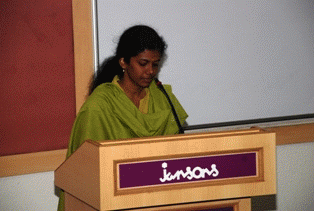
Description:
Topic : "Challenges in the current scenario in the HR perspective"
Guest Speaker : Mr. G. V. Suresh,
Head HR,
Interwoven.
Batch : 2010
Date : 31-01-2009
Time : 9.45 AM to 11.30 AM
Venue : Lecture Hall 1
Mr. G. V. Suresh is currently Head HR, Interwoven. (300 million US Dollar MNC with products used by 50% of fortune 500 companies.
He was the former HR Head with Raffles and served as a HR manager at Birlasoft.
He is also associated with NGO's such as Myrada, Vimochana, and Action Aid in various capacities.
Mr. Suresh raised thoughts that provoked the audience to think "out of the box". He rhetorically questioned whether India really has all the virtues to be called "a super power".
He pointed out that our country lacks political will and it is essential that we break away from superficial notions and stereotype attitudes. In the light of the recent attack in Mumbai, it is very evident that India is not prepared to attain the status of a "super power nation". Super power nation being one where utmost integrity, creativity, mutual trust prevails along with a sense of security and belongingness.
He lamented about the fact that inspite of being one of the fastest developing nations with a teeming population of over a billion, we have failed to provide basic infrastructure and amenities to the people, here he mentioned about having visited an exhibition (Pragathi Maidan, December 2007), organised by the WHO alongwith other NGOs. The theme of the exhibition left him aghast, "TOILETS"!! considering the number of engineers who pass out every year we still need someone from another nation to provide us the know-how to build and maintain toilets. Thus it shows that we lack the knack of paying attention to detailing and as professional we only walk on the beaten track.
He advised the audience to imbibe the true qualities of a leader and not look upon leadership as a mere title which is happening in the present scenario. When the concepts of leadership truly take root within the minds of people, exceptional leaders would be bo
. He also touched upon the controversial topic of recession and remarked that for people with a long term strategy this would not be a threat.
To conclude, he talked about three issues that gave us food for thought,
-
Personal health should always be given prime importance.
-
Try to get the access to as much information as possible.
-
Lea
to differentiate always, good from bad.
It was a very interactive session and a fruitful one.
Executive Interaction Programme
Author: Mr. M. Vishnu Vardhan & Mr. S. Periyasami
Date: 2009-01-27 00:00:00
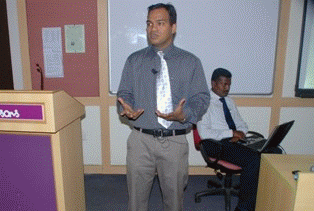
Description:
Topic : "Investor Awareness Programme on Indian Capital Market"
Guest Speakers : Mr. M. Vishnu Vardhan, Head - BDM
Mr. S. Periyasami, Head - Arbitration
BSE - Chennai
Batch : 2010 Batch
Date : 27.01.2009
Time : 9.45 AM to 1.00 PM
Venue : Lecture Hall 1
Jansons School of Business was visited by eminent members from Bombay Stock Exchange [BSE], Chennai. Mr. Vishnu Vardhan an MBA from IIMM, Pune, Deputy Manager - Dept. of Business Development and Marketing, BSE Ltd, Chennai and Mr. Periyasamy, an MBA from Anna University, Chennai, Assistant Manager - Dept. of Investor Service Center, BSE Ltd.
Sensex which means sensitive index, is an index which shows 30 companies of different sectors. The BSE is a platform to trade securities and is similar to other organizations. The BSE also constitutes various sectoral indices like BANKEX, IT etc. Mr. Vishnu discussed about the products at BSE like securities trading, derivatives, debt segments etc. Retail investors can buy shares of a company only through brokers - intermediaries of a stock exchange. He briefed about the investment choices in the securities market and the categories of market - primary market and secondary market. One of the major requirements for a company while raising an initial public offering (Initial raise of capital) is that the company can provide only 30% of stake to the public and the rest will be held by promoters, FIIs etc. The methods for offering an IPO price is either through fixed price offering or book building process. An investor must look into ea
ing per share (EPS), Price to ea
ings ratio (P/E) for a company before investing in that company. An intraday trader makes profit purchasing share of a company at a price and sells it at another stock exchange in a higher price. There was also an advise on not to invest in penny stocks and investors should not be misguided by rumors and speculations. Like exchanges for trading stocks, markets also existed for commodities namely commodity markets which trade perishable goods. Investors trading in these markets must have sound knowledge of it.
Mr. S. Periyasamy spoke about derivatives and its types. Derivatives derives its name from the underlying asset which may be stock, oil, gold, etc. These instruments are used to provide hedging against market risk. Hedging usually reduces the risk and does not maximize the profit. Many examples of including contracts of SAIL were discussed. The types of derivatives are futures, forwards, options and swaps. These are generally based on the principles that both the trading members come to an agreement on selling / buying an underlying at certain price in future date. He also discussed about resolving conflicts arising between investors and brokers. The disputes are handled by investor's grievances cell of BSE. This process is called arbitration. The major conflicts are in contract note which must be distributed to an investor when he purchases a stock. Compensation of up to Rs.10 lakhs can be availed in case of conflict resolution.
The session was interesting and interactive with many queries raised by students, and pool of knowledge was shared.
Executive Interaction Programme
Author: Prof. Suresh Paul Antony
Date: 2009-01-25 00:00:00
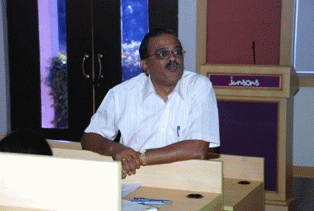
Description:
Topic : "Emerging Trends & Opportunities in Marketing"
Guest Faculty : Prof. Suresh Paul Antony,
Marketing Area,
IIM.
Batch : 2010 (A & B)
Date : 25.01.2009
Time : 5.00 PM
Venue : Lecture Hall 1
On 25th January, 2008 Prof. Suresh Paul Antony from the Indian Institute of Management, Lucknow addressed the JSB 2010 batch students and provided insights regarding the "Emerging Trends & Opportunities in Marketing".
The eminent professor began with a brief overview about the career opportunities and scope in the field of management teaching and research. He was driving home the importance and the need for today's youngster's vital role in this field. He laid down the value of pursuing a Doctorate in the field of management and showed the road ahead. He shared with the students, his career path in the industry, and henceforth as a facilitator in the Indian Institute of Management.
"NEVER FEEL DEFINITE, GIVE IT A TRY" were his words of encouragement. He poured in the minds of students, the need for field experience in management studies; he also explained it with the words from students with experience in the arena.
The issue of demographic change and its relevance to marketing was raised with the students. Survey reports of population by age from 1950-2050 were projected pertaining to the statistical analysis of the world and India. It conveyed the population is ageing with the current trend and more number of older people will be going to survive in India. The discussion swirled around issues like trend, culture and life style with the merge of Indian and Weste
culture.
The key of marketing as explained by the professor is attitude and the ability to buy. The changes in advertising strategies to grapple with the demographic changes were also explored. He shared with the students his observations over a few decades regarding the same. An example of Cadbury dairy milk was taken up and analyzed as to how old aged people are targeted now-a-days. He clearly projected the different segments (age) of population being focused in different time periods for the same product.
The essence of marketing and its electives were also focused. He encouraged the students to take up streams for their passion, with no fear for recession. He extended his warm wishes to the emerging managers of tomorrow's developed nation.
Executive Interaction Programme (EIP)
Author: Mr.Anantha Padmanabhan
Date: 2009-01-24 00:00:00
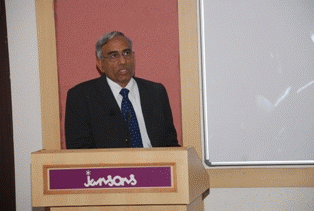
Description:
Topic : Application of Operations Management in Service Industries.
Guest Speaker : Mr.Anantha Padmanabhan
Seniour Vice President., KMCH
Coimbatore
Batch : 2010 (A&B)
Date : 24.01.2009
Time : 03.30pm to 05.00 pm
Venue : Lecture Hall-1
JANSONS SCHOOL OF BUSINESS had the privelege of having Mr.U.K.Anantha Padmanabhan, President, KMCH to give us an interesting seesion on the topic "Application of the state of the art and technology in hospital management".
Mr.U.K.Anantha Padmanabhan, is an engineer, who has post graduated in Business Management and has done a post graduate diploma in Hospital Management. He joined KMCH in 1990 and pursues to be the president of the hospital. He did his training in many medical equipment manufacturing facilities and healt organizations in various countries. He did his Hospital management training at Cleveland clinic, Texas Heart Centre at St. Lukes hospital, US, He was a representative of the health care group in the Indian IT delegation to China. He was also a member of the advisory board of the Indian Institute of Health Management.
Dr.U.K.Anantha Padmanabhan enlightened the audience will the wonders of how well one can manage a hospital with appropriate use of technology despite constraints regarding the size of the organization. He also mentioned the various combinations of technology and its application through devices, followed by its appropriate usage in different scenarios starting from rural development to urban advancement. Dr.U.K.Anantha Padmanabhan spoke about the step by step procedure on how one can design a work flow by following a sequence of essential activites thereby deploying technology on it to eliminate waste. His words on how to perceive technological advancement in the right way was an eye opener to the audience.
His presentation on the technical aspects like neumatic pipe line system, robotics, intranet, inte
et, primary rate interface, bar coding, GPS, RFID, podcasting and biometrics and their importance in hosiptal management enhanced the interest of the crowd. He also emphasized various ways to reduce wastage of manpower and energy consumption within an organization.
The E.I.P was concluded by a question & answer session in which the students and the faculty activity participated with their queries and suggestions.
Executive Interaction Programme
Author: Dr. Nitin Devaraj
Date: 2009-01-17 00:00:00
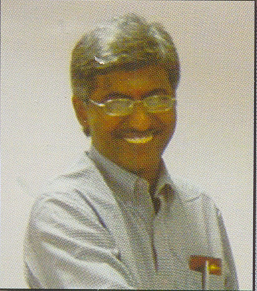
Description:
Topic : "Operations Strategy & Competitiveness"
Guest Speaker : Dr. Nitin Devaraj,
Head - Operations,
L & T, Coimbatore.
Batch : 2010 (A & B)
Date : 17-01-2009
Time : 3.30 PM - 5.00 PM
Venue : Lecture Hall 1
The Interaction programme started with the sharing of industrial experience of Dr. Nitin Devaraj. Dr. Nitin Devaraj, presently the Head – Operations L & T. He has an industrial experience of more than 15 years and contributed lots of ideas towards the field of operations, besides organising many seminars in the field of operations management.
Dr. Nitin Devaraj started the session by defining what strategy is, and explained how strategy is linked with operations management, in addition to throwing light on why strategy deals with efficiency, productivity and discipline. The corporate examples given by him illustrated the concept. He also explained the strategy followed by LG, Reliance, and FedEx.
While explaining the operations management he made the students to think what the objective of an organization at present is. He said that now the organizations look at customer delight rather than profit making.
It was necessary to understand the role of product competitiveness among companies and the role of operations field which will help to make the product better than the competitor’s. According to him, the major competitive features in products are generally product characteristics, price, performance, packing, and packaging.
The next part of the presentation was on process competitiveness. Here, the role of Controls, Efficiency and Effectiveness, Capacity and capability, Availability and Response speed, Delivery speed and Accuracy, Value and Volume and Market Position, were elaborated. There was also a reference to people competitiveness in this field.
He explained that the operation field is directly linked to the quality control of the product and the facts which give the quality products are challenging market, diminishing technology, high interest cost, poor infrastructure, lack of discipline, low productivity, among others.
The advantages and disadvantages of the operations management field were also highlighted. He threw light on building brand competitiveness and organizational competitiveness. He made students aware about JIT, KANBAN, TPM/TQM practices, six sigma and KAIZEN.
While concluding he explained the current scenario and development in the field of operation, and also what not to do and the role of team work in the organization. To be a successful organization, operation sector must be committed and disciplined which creates quality products.
Talk on "Emerging Trends in Development Sector"
Author: Mr. D. T. Reji Chandra
Date: 2009-01-20 00:00:00
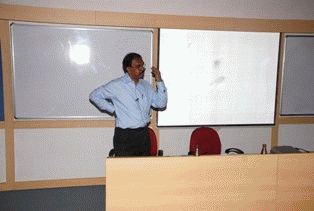
Description:
Talk on "Emerging Trends in Development Sector".
Author:
Mr. D. T. Reji Chandra,
Director,
PWDS, Madurai.
Date : 20-01-2009
Time : 9.00 AM
Venue : Lecture Hall
Executive Interaction Programme with Mr. D. T. Reji Chandra
The Interaction Programme started with the sharing of experience of Mr. D.T. Reji Chandra in the development sector. D.T. Reji Chandra, presently the director of PWDS has an industrial experience of 20 years. He has implemented 65 projects and presently working on development projects which include 30 districts with Tamil Nadu.
Mr. D.T. Reji Chandra started the session with the overview of the opportunities and the orientation of the Development Sector, and explained how development sector is linked with Business management. He also explained the role of organizations in development sector, Non-gove
ment organizations (NGOs), Voluntary organizations, Social (sector) organizations, Non-profit organizations, civil society organizations (CSOs), and Development agencies. He also spoke about commercial and social sector and the type of organizations which play a role in the development sector.
Why does a development sector exists, how it helps in the development of the people, and what role does it have in Community competency, Economic, Social, National and human development, where some of the issues raised and addressed by the speaker.
He spoke about the approach of development sectors towards the community and sectors. The community sectors includes Women, Children, Dalits, Tribals, Artisans, People with special needs.
Sector-specific information on Health, Agriculture, Finance, Economics, Market, Enterprises/business, Shelter, among others, was also highlighted. He then spoke about the strengths and limitations of the development sectors.
He threw light on IASC (Indian Association for Saving and Credit) and how they helped in development sector.
While concluding he spoke about the social and economic goal of development sector. It was his contention that the popular belief the social and economic sectors have conflicting interests is currently fading. The social and economic goals, often perceived as inherently conflicting, are now being understood as integrally connected. Only such an approach, where the economic and social goals merge, can promote social responsibility in the business sector and ensure tangible results and sustainable impacts in the social/development sector.
Sathish Kumar
MB10B44
A Discussion with Mr. D. T. Reji Chandra
A discussion with a group of 16 students was organised, in which Mr. Reji Chandra responded to the questions raised by the students. The primary question that the students had in mind was the significance of the role of Corporate Social Responsibility (CSR) to a company and to a society. It was here that the esteemed speaker delineated four different ways of looking at the whole aspect of CSR.
-
CSR as charity / welfare programme
-
CSR as strategic philanthropy
-
CSR as joint social projects (wtih NGOs), and
-
CSR as an act of a company to not make decisions on profits that would affect non-stakeholders adversely (i.e., a case of negative exte
ality)
Mostly, the discussion with the students centered around the following issues, which were taken up by the speaker with a lot of zest.
-
Why does a company say that it will donate a part of the proceeds towards a cause (a similar case with book sellers)?
-
What does profit mean for a non-profit organisation (the simple answer to this was that this so-called 'profit' is actually a 'surplus' that will be used for doing more development work)
-
What is the motive of an NGO? (the term 'motive' should be supplanted with the term 'mission')
-
Role of NGOs in aiding women and children (say, through micro finance)
-
The idea that environment is spoiled only by poor people (rather, environmental threat comes from rich and big corporations)
-
Role of gove
ment is doing development work in India.
Mr. Reji also talked about the Indian Association for Saving and Credit (IASC) as a successful case, recognised by the UN. Another work if similar importance that was close to his heart was the model of inte
ational acclaim, the CSC model (Collective Forms of Co-operation), which is also one of the few successful models in NGO collective management.
Executive Interaction Programme
Author: Mr. K. L. Bhaskaran
Date: 2009-01-11 00:00:00
Description:
Subject : "Supply Chain Management"
Guest Speaker : Mr. K. L. Bhaskaran,
Supply Chain Consultant,
Coimbatore.
Batch : 2009
Date : 11.01.2009
Time : 3.00 PM to 6.00 PM
Venue : Lecture Hall - 6
Executive Interaction Programme
Author: Mr. K. L. Bhaskaran
Date: 2008-12-21 00:00:00
Description:
Subject : "Supply Chain Management"
Guest Speaker : Mr. K. L. Bhaskaran,
Supply Chain Consultant,
Coimbatore.
Batch : 2009
Date : 21-12-2008
Time : 9.00 AM to 1.00 PM
Venue : Lecture Hall 6
Executive Interaction Programme
Author: Mr. V. Yuvaraj, Nilgiris Dairy Farms Pvt. Ltd.,
Date: 2008-12-16 00:00:00
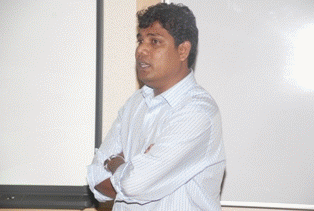
Description:
Topic : "Retailing"
Guest Faculty : Mr. V. Yuvaraj,
Merchandise Manager,
Nilgiris Dairy Farms Pvt. Ltd.,
Tamilnadu.
Batch : 2009 (A & B)
Date : 16-12-2008
Time : 4.00 PM
Venue : Lecture Hall 6
Executive Interaction Programme
Author: Dr. N. Chandrasekaran
Date: 2008-11-23 00:00:00
Description:
Topic : "Current Trends in HR"
Guest Speaker : Dr. N. Chandrasekaran,
Head HR,
Take Solution Ltd.,
Chennai.
Batch : 2010 (A & B)
Date : 23-11-08
Time : 11.00 AM - 1.00 PM
Venue : Lecture Hall 6
Executive Interaction Programme
Author: Dr. S. Tamilselvan
Date: 2008-11-13 00:00:00
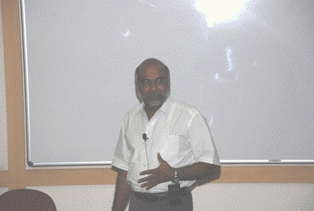
Description:
Subject : " Organizational Behaviour in Practice"
Guest Faculty : Dr. S. Tamilselvan,
Director in Management Studies,
Mepco Schlenk Engineering College,
Sivakasi.
Batch : 2010 (A & B)
Date : 13-11-2008
Time : 9.30 AM - 12.30 PM
Venue : Lecture Hall 6
Executive Interaction Programme
Author: Mr.C.G Kumar
Date: 2008-11-07 00:00:00
Description:
Guest Speaker: Mr. C. G. Kumar,
Advocate.
Batch: 2009(A&B)
Date: 07/11/2008
Time: 2.00 pm to 5.00 pm
venue: Lecture hall: 6
Executive Interaction Programme
Author: Mr.Baburaj Nair
Date: 2008-10-31 00:00:00
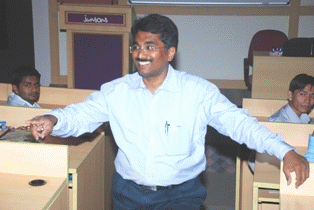
Description: Guest Speaker:
Mr Baburaj Nair
Head - HR
EICHER Motors
Indore.
Batch: 2010(A&B)
Date: 31/10/2008
Time: 6.00 pm to 8.30pm
venue: Lecture hall: 6
Traditional Style Of Onam
Author: Onam Celebration in JSB
Date: 2008-09-08 00:00:00
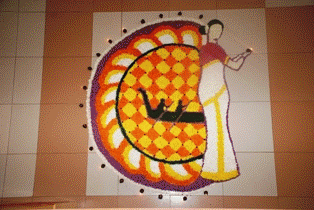
Description:
JSBians celebrated Onam, the traditional harvest festival of Kerala, with great zeal and gaiety on 8 September. Early in the mo
ing various floral carpets called 'Pookalam' were laid at the lobby to welcome King Mahabali. Professors and students gathered and enjoyed the time at the lobby. After that every one dispersed for their regular classes.
Soon, heavy rush was witnessed in Food Court for Onam feast in the afte
oon. All were traditionally dressed in new clothes. Lip smacking savories like 'Kicchadi', 'Drum stick', 'Coconut rice', 'Chips', 'Dal', 'Payasam' and various other items were served on the Plantain Leaves making it a grand 'Onam Sandya'.
After lunch 'Shinghari Melam' was performed making students dance to the drum beats.In the next few hours, games such as 'Tug of War' and 'Uriyadi' were organized. Every one participated with keen interest. Later in the evening cultural programs were organized in the 'Padmam' auditorium. The program started with 'Thiruvathira kali' (a traditional dance from kerala). Ms.Lalitha of 2010 batch enthralled the audience with her immaculate Bharatnatyam dance performance. The celebrations culminated with the announcement of results for 'Pookalam', Games and 'Traditional dress' contests and the prizes were distributed by Professor. Dr.S. Krishna Kumar.
JSB gets ISO 9001:2000 certification from TUV SUD
Author: ISO 9001:2000
Date: 2008-10-01 00:00:00
Description:
Jansons School of Business received ISO 9001:2000 certifications from TUV SUD, for successfully developing, implementing and maintaining Quality Management System, as per the ISO standards. ISO 9001 certification is the first step in a never-ending jou
ey toward continuous improvement .
Jansons School of business showed improvements in three key areas to get the ISO 9001:2000 certification
- Creating a common structure
- Creating a method to demonstrate continual improvement
- Developing metrics to determine how effectively inte
al processes are working with a focus on improving results
The certification audit was conducted by TUV SUD on October 1, 2008. TUV SUD is a globally recognized testing, inspection and certification organization offering the highest quality services for a wide range of industries and institutes worldwide.
Audit was mainly based on observing ongoing operations at JSB, Interviewing employees working at various levels in JSB, reviewing documentation and evaluating quality records of JSB. The quality management system of JSB was then evaluated against objectives, strategies and vision statement of JSB. JSB aligned everything to ensure overall success and continuous improvement. Based on the audit findings, the certifying body has recommended the institute for the ISO 9001:2000 certifications. This certificate is valid for 3 years.
The Management and the Director congratulate the Management Representative for ISO Administrative Officer, Mr.M.Karthikeyan, Faculty coordinator by Prof. D. Swamy, all the faculty members, Librarian, Mr.A.M.Venkatachalam, Systems Manager, Mr.P.Mahesh Raja and others for putting in their best efforts in getting this coveted quality certification for the institute.
Satish Kumar
2010 Batch
DOMAIN
Author: The Journal of Management Research
Date: 2008-10-22 00:00:00
Description:
DOMAIN, the peer-refereed academic and research bi-annual jou
al of Jansons School of Business features state-of-the-art management techniques, research, theories and applications. It addresses the broad interests of the management profession, and maintains an editorial balance of content about research, technique, theory and practice.
DOMAIN is designed to address issues of relevance to scholars as well as practitioners, especially in areas where these two communities intersect. DOMAIN’s inte
ational and multi-disciplinary review team ensures continued standards of excellence in terms of quality of content and reputation among the academic community. The audience for this includes Management practitioners, academicians, executives, business leaders and other individuals who seek to further their management skills and practices
What distinguishes DOMAIN is our commitment to publish works that result from the relationship between management theory and management practice in a co-production model of knowledge development. We speak to practitioners at all levels and in all sectors, addressing problems which are of direct relevance to improving the competitive and social performance of industry and the effectiveness and quality of services.
Areas of interest to this maiden issue include but are not limited to experiential exercises, cases, problem-based lea
ing sets, and designs. We are also interested in re-design of those that may include course innovations, collaborative lea
ing with other business disciplines, and ways of lea
ing about management and organizational behavior that have escaped from orthodox boundaries of definition and publication. We are interested in radical ideas supported by experience and science. In short, we are looking for innovation with integrity.
It would be difficult to overestimate the impacts of JSB’s leadership over the past many years in the field of management education especially in running the world class full time residential MBA program that is perceived as one of the best B-Schools in the state. The bringing of a management jou
al DOMAIN itself is organized to assure useful responses to the stakeholders and a forum to connect them all.
JSB Staff members have lent their considerable talents and energies to planning and constructing appropriate databases, outlining work flow, and taking care of additional needs in releasing this jou
al so that we can devote appropriate time and energy to assuring JSB’s continued high quality.
Prof. R. Chandrasekaran
Executive Editor
Executive Interaction Programme
Author: Mr. B. Venkataramana
Date: 2008-10-28 00:00:00
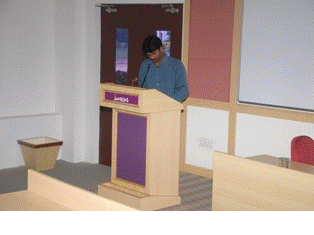
Description:
Guest Speaker :
Mr. B. Venkataramana,
Sr. Vice President - HR,
Reliance Retail Ltd,
Chennai.
Batch : 2009 (A & B)
Date : 28-10-2008
Time : 10.30 AM to 12.30 PM
Venue : Lecture Hall 6
Executive Interaction Programme
Author: Dr. P. Radhakrishnan
Date: 2008-10-25 00:00:00
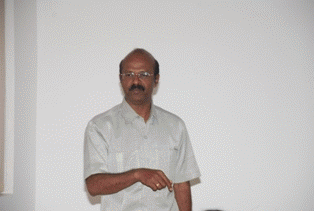
Description:
Guest Speaker : Dr. P. Radhakrishnan,
Winsquare
Batch : 2009 (A & B)
Date : 25-10-2008
Time : 9.00 AM to 3.00 PM
Venue : Lecture Hall 4
Executive Interaction Programme
Author: Mr. P. K. Gopalakrishnan
Date: 2008-10-20 00:00:00
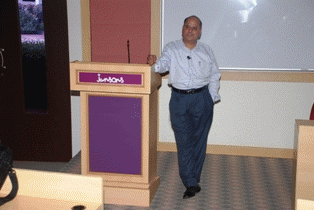
Description:
Guest Speaker: Mr. P. K. Gopalakrishnan,
Vice President - HR,
IndusInd Bank,
Chennai.
Batch : 2009 (A & B)
Date : 20-10-2008
Time : 1.30 PM
Venue : Lecture Hall - 6
Orientation Class on NCFM
Author: Mr. Shyam Sundar
Date: 2008-10-17 00:00:00
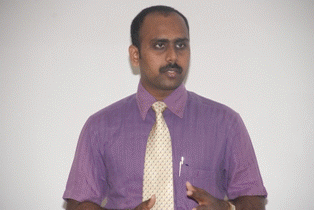
Description:
Topic : "Orientation Class on NCFM Certification Course"
Module : Capital Market Dealers Module.
Guest Speaker : Mr. Shyam Sundar,
Sr. Executive Officer,
National Stock Exchange,
Chennai.
Batch : 2009 (A & B)
Date : 17-10-2008
Time : 10.00 AM - 5.00 PM
Venue : Lecture Hall - 5













